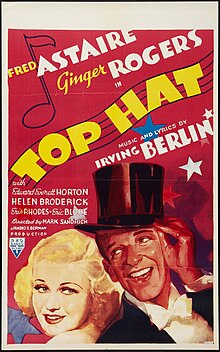
Back Top Hat AN القبعة العلوية (فيلم) Arabic توپ هات ARZ Цилиндър (филм) Bulgarian Barret de copa Catalan Top Hat Welsh Ich tanz’ mich in dein Herz hinein German Sombrero de copa (película) Spanish Top Hat Basque کلاه سیلندری (فیلم) Persian
| Top Hat | |
|---|---|
 Theatrical release poster | |
| Directed by | Mark Sandrich |
| Screenplay by | |
| Story by | Dwight Taylor |
| Based on | A Scandal in Budapest 1911 play by Alexander Faragó and Aladar Laszlo[1] |
| Produced by | Pandro S. Berman |
| Starring | Fred Astaire Ginger Rogers |
| Cinematography | David Abel |
| Edited by | William Hamilton |
| Music by | Irving Berlin |
Production company | |
| Distributed by | RKO Radio Pictures |
Release dates |
|
Running time | 101 minutes |
| Country | United States |
| Language | English |
| Budget | $609,000[3] |
| Box office | $3.2 million[3] |
Top Hat is a 1935 American musical screwball comedy film in which Fred Astaire plays an American tap dancer named Jerry Travers, who comes to London to star in a show produced by Horace Hardwick (Edward Everett Horton). He meets and attempts to impress Dale Tremont (Ginger Rogers) to win her affection. The film also features Eric Blore as Hardwick's valet Bates, Erik Rhodes as Alberto Beddini, a fashion designer and rival for Dale's affections, and Helen Broderick as Hardwick's long-suffering wife Madge.
The film was directed by Mark Sandrich, and was written by Allan Scott and Dwight Taylor, with songs by Irving Berlin. "Top Hat, White Tie and Tails" and "Cheek to Cheek" have become American song classics. It has been nostalgically referred to — particularly its "Cheek to Cheek" segment — in many films, including The Purple Rose of Cairo (1985), The Green Mile (1999), and The Boss Baby (2017).
Astaire and Rogers made nine films together at RKO Pictures, including: The Gay Divorcee (1934), Roberta (1935), Top Hat (1935), Follow the Fleet (1936), Swing Time (1936), Shall We Dance (1937), and Carefree (1938). Top Hat was the most successful picture of Astaire and Rogers' partnership (and Astaire's second most successful picture after Easter Parade), achieving second place in worldwide box-office receipts for 1935.[4] While some dance critics maintain that Swing Time contained a finer set of dances,[4][5] Top Hat remains, to this day, the partnership's best-known work.[6]
Top Hat was selected for preservation in the United States National Film Registry by the Library of Congress in its second year, 1990, as being "culturally, historically, or aesthetically significant".[7] The film has also been recognized by the American Film Institute on various lists commemorating the best of American cinema; the film appeared on their list of the twenty five greatest film musicals at number 15, and "Cheek to Cheek" appeared on their list of the one hundred greatest songs of American cinema, also at number 15.
- ^ "AFI|Catalog".
- ^ Brown, Gene (1995). Movie Time: A Chronology of Hollywood and the Movie Industry from Its Beginnings to the Present. New York: Macmillan. p. 124. ISBN 0-02-860429-6.
- ^ a b Jewel, Richard. "RKO Film Grosses: 1931–1951" in Historical Journal of Film, Radio and Television, Vol 14 No 1, 1994 p55
- ^ a b Mueller (1986), pp.76–87
- ^ Croce (1972), pp.54–79
- ^ Hyam (2007)
- ^ "Complete National Film Registry Listing". Library of Congress. Retrieved May 13, 2020.